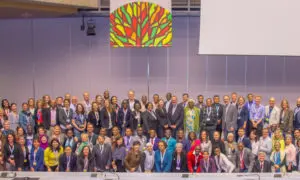 The decision to postpone the 2020 Conference of the Parties (COP9) to the World Health Organization Framework Convention on Tobacco Control (WHO FCTC) to next year could be good news for the tobacco alternatives sector.
The decision to postpone the 2020 Conference of the Parties (COP9) to the World Health Organization Framework Convention on Tobacco Control (WHO FCTC) to next year could be good news for the tobacco alternatives sector.
“It buys time,” Canadian tobacco control expert David Sweanor told ECigIntelligence. “A lot of really dramatic changes are happening and over time it becomes much harder to oppose tobacco alternatives.”
The conference, originally planned to take place in the Netherlands in October, has been rescheduled for November 2021 because of the COVID-19 pandemic.
Sweanor, a professor of law at the University of Ottawa, believes that between now and then new nicotine technologies will become further entrenched and scientific studies could potentially support them as effective alternatives to smoking.
“Products that grab 1% to 2% of the market, it’s easy to ban them,” he said. “But if they have 30% it’s not as easy. Also, more data will be coming up showing that these alternatives are good, so it becomes much harder for the abstinence-only people.”
‘Time to rethink’
In the last meeting of the FCTC in Geneva in October 2018, the WHO maintained its hard line on e-cigarettes and heated tobacco and called for tighter regulations.
The postponement of the next edition could be good news for public health and may be good for the WHO if the Geneva-based organisation uses the time to rethink its approach, according to former UK public health official Clive Bates.
“There is a persistent problem with the WHO relying on poor evidence or the motivated reasoning of activists,” Bates told ECigIntelligence.
“More time means more evidence to challenge bad decision-making and to make the case for tobacco harm reduction. It also means that some of the alarmist scares that got WHO excited in 2019 – like the lung injuries episode in the United States – will have faded in memory and can no longer be incorrectly blamed on nicotine vaping.”
On the flip side, governments around the world “will continue to make policy based on bad advice and hints from the WHO for another year,” Bates added.
‘Some kind of witch trial’
Plans for what he described as “some kind of witchcraft trial” for electronic nicotine delivery systems during COP9 “will have to go on hold”, he said.
Also, the new date for COP9 makes the European Commission’s upcoming impact assessment report on the EU Tobacco Products Directive (TPD) more relevant, because if all goes as planned it will be presented a few months before the conference.
Bates does not expect the recent decision by US president Donald Trump to halt funding to the WHO in reaction to its COVID-19 response will have much impact on the FCTC. The tobacco treaty’s secretariat is a separate body and funded by the parties – which don’t include the US.
But some insiders agree that WHO-connected agencies such as the FCTC could be “under much more public scrutiny” from now onwards.
What This Means: The postponement of the COP9 will give the organisers and involved parties more times to assess and prepare political positions towards tobacco control, including the regulation of e-cigarettes and new tobacco products such as heated tobacco.
In 2018, COP8 ended with governments struggling to regulate e-cigarettes due to the lack of scientific proof on potential risks or benefits. It is yet to be seen if the next edition in 2021 will be able to make decisions based more soundly on up-to-date scientific evidence.
– Jennifer Freedman ECigIntelligence contributing writer







